-
Countries
-
Data and Analysis
-
Special Focus
-
Crisis Responses

Contact
DTMMozambique@iom.int
Language
English
Location
Mozambique
Period Covered
May 11 2022
May 17 2022
Activity
- Mobility Tracking
- Event Tracking
During the reporting period (11 to 17 May 2022), a total of 91 movements were recorded - 44 returns (2,097 individuals), 23 arrivals (1,036 individuals), 19 departures (472 individuals), and 5 transits (268 individuals). The largest return movements were recorded in Muidumbe (685 individuals), Palma (630 individuals) and Macomia (377 individuals). The largest arrival movements were recorded in Macomia (641 individuals), Cidade de Pemba (137 individuals), Nangade (129 individuals) and Mueda (114 individuals). The largest departure movement was observed in Nangade (339 individuals). The largest transit movement was observed in Mueda (268 individuals). Of the total population, 7 per cent of mobile groups were displaced for the first time, and 97 per cent of reported individuals were displaced prior to this movement.

Contact
DTM Nigeria, AllUsersInDTMNigeria@iom.int
Language
English
Location
Nigeria
Period Covered
May 09 2022
May 15 2022
Activity
- Mobility Tracking
- Event Tracking
The DTM Emergency Tracking Tool (ETT) is deployed to track and to collect information on large and sudden population movements, provide frequent updates on the scale of displacement and quantify the affected population when needed. As a sub-component of the Mobility Tracking methodology in Nigeria. ETT utilises direct observation and a broad network of key informants to capture best estimates of the affected population per location, enabling targeted humanitarian response planning.
Between 09 and 15 May 2022, a total of 1,923 movements were recorded in Adamawa and Borno States. The recorded movements consisted of 1,545 arrivals and 378 departures. Arrivals were recorded at locations in Askira/Uba, Bama, Damboa, Gwoza, Hawul, Kala/Balge, Monguno and Ngala Local Government Areas (LGAs) of the most conflict-affected state of Borno and in Fufore, Girei, Gombi, Hong, Lamurde, Maiha, Michika, Song, Yola North and Yola South LGAs of Adamawa State.
Departures were recorded in Gwoza and Kala/Balge LGAs of Borno State and in Fufore, Gombi, Hong, Lamurde, Maiha, Song, Yola North and Yola South LGAs of Adamawa State.
ETT assessments identified the following movement triggers: search for better living conditions (976 individuals or 51%), improved security (280 individuals or 14%), seasonal farming (232 individuals or 12%), poor living conditions (174 individuals or 9%), access to humanitarian support (111 individuals or 6%), family reunification (94 individuals or 5%) and military operations (56 individuals or 3%).

Contact
DTM Djibouti, DTMDjibouti@iom.int
Language
French
Location
Djibouti
Period Covered
Apr 01 2022
Apr 30 2022
Activity
- Flow Monitoring
Pendant le mois d’avril 2022, 16 339 mouvements ont été observés aux points de suivi des flux (Flow Monitoring Points, FMP) à
Djibouti, soit une moyenne journalière de 545 mouvements. Les flux migratoires ont augmenté de seulement 2 pour cent par
rapport au mois de mars 2022, pendant lequel 518 mouvements avaient été observés en moyenne chaque jour. Cependant, ils
n’ont pas encore atteint les niveaux observés pendant la période antérieure à la pandémie de COVID-19 (entre mars 2019 et
mars 2020, la moyenne journalière était de 654).
Sur ces 16 339 mouvements, 2 950 (18%) ont été observés à Obock dans la région côtière de Djibouti où les migrants
traversent le golfe d'Aden vers la péninsule arabique le long de ce que l'on appelle la route de l'est.
Depuis janvier 2022, les mouvements en provenance de l’Éthiopie ont connu une hausse significative (21%) par rapport à ceux
observés mensuellement l’an dernier pendant la même période. En 2022, un total de 35 269 migrants de l’Éthiopie sont entrés à
Djibouti. Par ailleurs, 2 390 Éthiopiens sont revenus du Yémen depuis janvier 2022. En effet, au début de la pandémie de
COVID-19, ces retours étaient principalement dûs aux restrictions de mouvement en vigueur au Yémen et en Arabie Saoudite.
La progressive détérioration des conditions de vie au Yémen a ensuite également entraîné des retours

Contact
DTM Djibouti, DTMDjibouti@iom.int
Language
English
Location
Djibouti
Period Covered
Apr 01 2022
Apr 30 2022
Activity
- Flow Monitoring
In April 2022, 16,339 movements were observed at the Flow Monitoring Points (FMPs) in Djibouti, representing a daily average
of 545 movements. Migration flows increased by only 2 per cent compared to the month of March 2022, during which an
average of 518 movements had been registered daily. It is worth highlighting that migration flows have not yet reached pre-
COVID-19 levels (between March 2019 and March 2020, the daily average was 654).
Of these 16,339 movements, 2,950 (18%) were observed in Obock. This coastal region of Djibouti is the main gateway for
migrants going to and returning from the Arabian Peninsula. Migrants regroup at congregation points in the Obock region where
they then cross the Gulf of Aden on boats along what is known as the Eastern route.
Since January 2022, movements from Ethiopia have increased sharply (21%) compared to those observed monthly last year
during the same period. In 2022, a total of 35,269 migrants from Ethiopia entered Djibouti. In addition, 2,390 Ethiopians have
returned from Yemen since January 2022. At the beginning of the COVID-19 pandemic, these movements were mainly due to
mobility restrictions imposed in Yemen and Saudi Arabia. Subsequently, the progressive deterioration of living conditions in
Yemen also triggered growing numbers of spontaneous returns. The trend of these returns has been steadily increasing since the
beginning of the year.
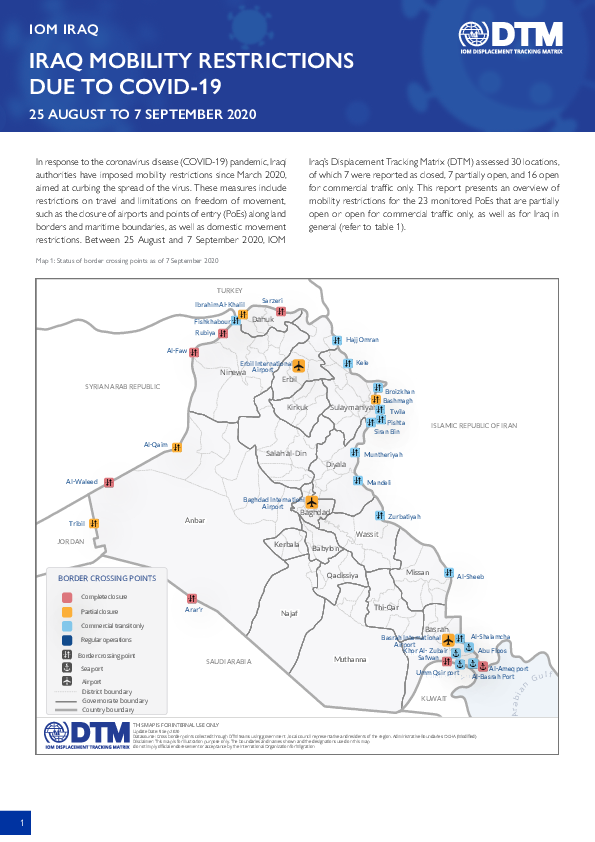
Contact
DTM Iraq, IraqDTM@iom.int
Language
English
Location
Iraq
Period Covered
Aug 25 2020
Sep 07 2020
Activity
- Flow Monitoring
- Points of Entry (PoE)
In response to the coronavirus disease (COVID-19) pandemic, Iraqi authorities have imposed mobility restrictions since March 2020, aimed at curbing the spread of the virus. These measures include restrictions on travel and limitations on freedom of movement, such as the closure of airports and points of entry (PoEs) along land borders and maritime boundaries, as well as domestic movement restrictions. Between 25 August and 7 September 2020, IOM
Displacement Tracking Matrix (DTM) in Iraq assessed 30 locations, of which 7 were reported as closed, 7 partially open, and 16 open for commercial traffic only. This report presents an overview of mobility restrictions for the 23 monitored PoEs that are partially open or open for commercial traffic only, as well as for Iraq in general
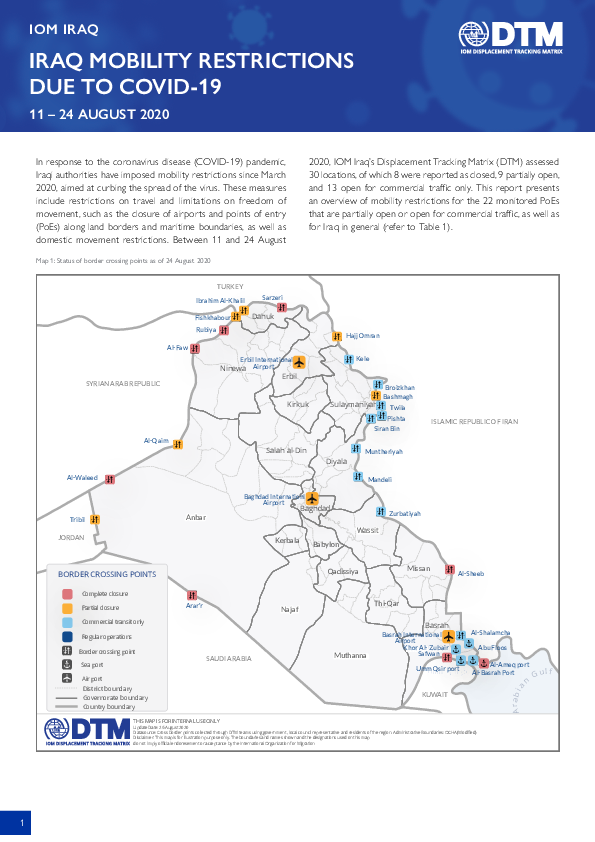
Contact
DTM Iraq, IraqDTM@iom.int
Language
English
Location
Iraq
Period Covered
Aug 11 2020
Aug 24 2020
Activity
- Flow Monitoring
- Points of Entry (PoE)
In response to the coronavirus disease (COVID-19) pandemic, Iraqi authorities have imposed mobility restrictions since March 2020, aimed at curbing the spread of the virus. These measures include restrictions on travel and limitations on freedom of movement, such as the closure of airports and points of entry (PoEs) along land borders and maritime boundaries, as well as domestic movement restrictions. Between 11 and 24 August 2020, IOM Iraq’s Displacement Tracking Matrix (DTM) assessed 30 locations, of which 8 were reported as closed, 9 partially open, and 13 open for commercial traffic only. This report presents an overview of mobility restrictions for the 22 monitored PoEs that are partially open or open for commercial traffic, as well as for Iraq in general.
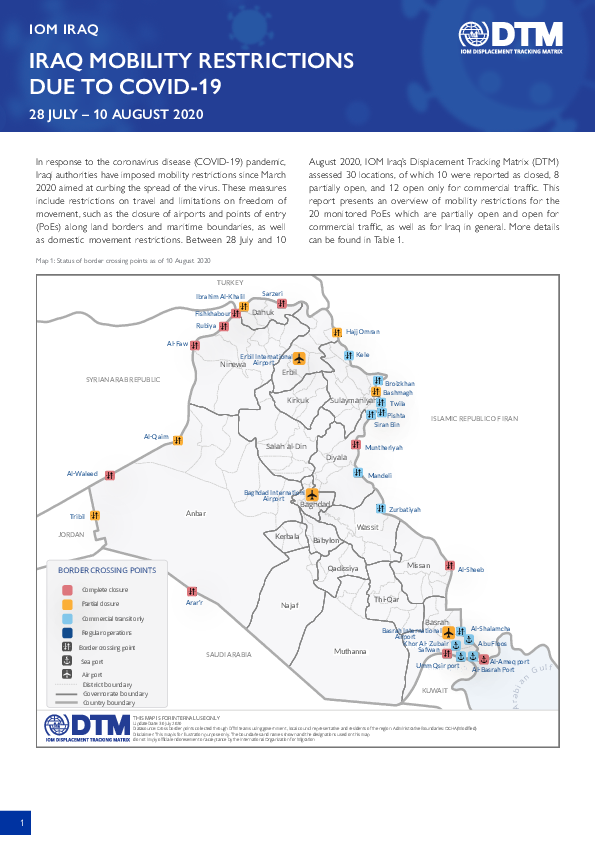
Contact
DTM Iraq, IraqDTM@iom.int
Language
English
Location
Iraq
Period Covered
Jul 28 2020
Aug 10 2020
Activity
- Flow Monitoring
- Points of Entry (PoE)
In response to the coronavirus disease (COVID-19) pandemic, Iraqi authorities have imposed mobility restrictions since March 2020 aimed at curbing the spread of the virus. These measures include restrictions on travel and limitations on freedom of movement, such as the closure of airports and points of entry (PoEs) along land borders and maritime boundaries, as well as domestic movement restrictions. Between 28 July and 10 August 2020, IOM Iraq’s Displacement Tracking Matrix (DTM) assessed 30 locations, of which 10 were reported as closed, 8 partially open, and 12 open only for commercial traffic. This report presents an overview of mobility restrictions for the 20 monitored PoEs which are partially open and open for commercial traffic, as well as for Iraq in general.
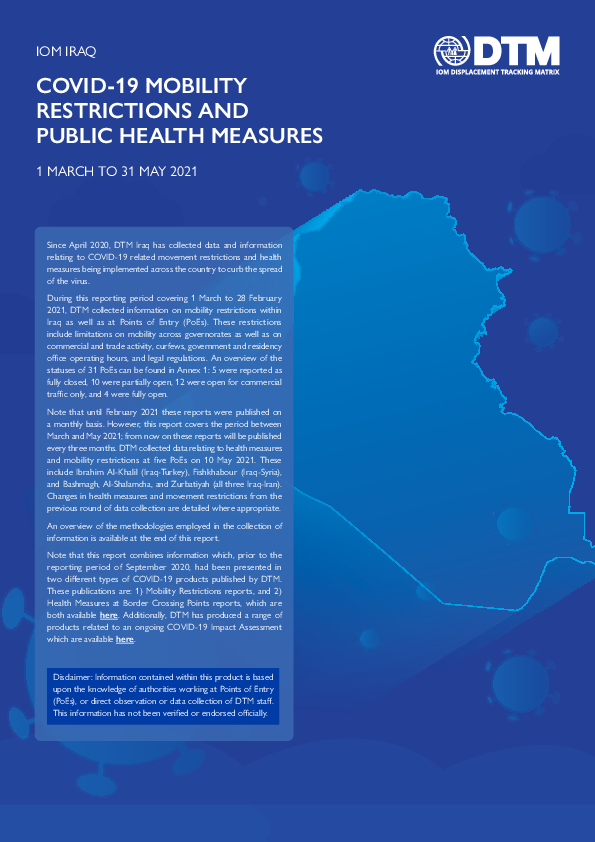
Contact
DTM Iraq, IraqDTM@iom.int
Language
English
Location
Iraq
Period Covered
Mar 01 2021
May 31 2021
Activity
- Flow Monitoring
- Points of Entry (PoE)
Since April 2020, DTM Iraq has collected data and information relating to COVID-19 related movement restrictions and health measures being implemented across the country to curb the spread of the virus.
During this reporting period covering 1 March to 31 May 2021, DTM collected information on mobility restrictions within Iraq as well as at Points of Entry (PoEs). These restrictions include limitations on mobility across governorates as well as on commercial and trade activity, curfews, government and residency office operating hours, and legal regulations.
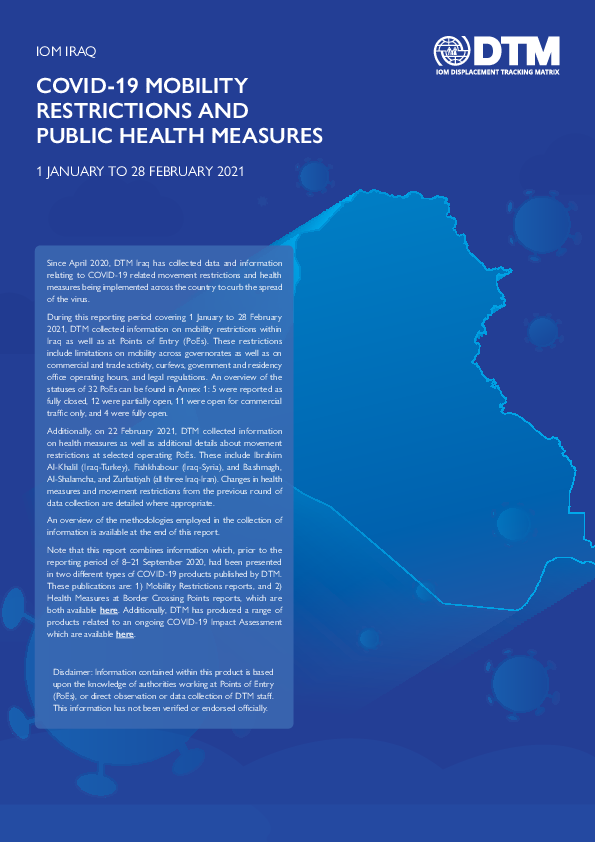
Contact
DTM Iraq, IraqDTM@iom.int
Language
English
Location
Iraq
Period Covered
Jan 19 2021
Feb 28 2022
Activity
- Flow Monitoring
- Points of Entry (PoE)
Since April 2020, DTM Iraq has collected data and information relating to COVID-19 related movement restrictions and health measures being implemented across the country to curb the spread of the virus.
During this reporting period covering 1 January to 28 February 2021, DTM collected information on mobility restrictions within Iraq as well as at Points of Entry (PoEs). These restrictions include limitations on mobility across governorates as well as on commercial and trade activity, curfews, government and residency office operating hours, and legal regulations.

Contact
DTM Iraq, IraqDTM@iom.int
Language
English
Location
Iraq
Period Covered
Dec 01 2020
Dec 31 2020
Activity
- Flow Monitoring
- Points of Entry (PoE)
ince April 2020, DTM Iraq has collected data and information relating to COVID-19 related movement restrictions and health measures being implemented across the country to curb the spread of the virus.
During this reporting period covering 1 to 31 December 2020, DTM collected information on mobility restrictions within Iraq as well as at Points of Entry (PoEs). These restrictions include limitations on mobility across governorates as well as on commercial and trade activity, curfews, government and residency office operating hours, and legal regulations.
